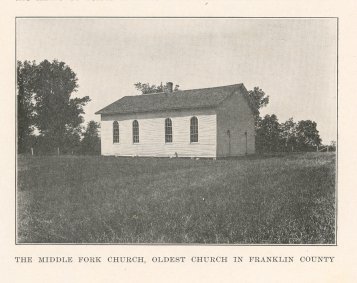
Pg 61
The Johnsons, Vises, and Fishers settled in and around Macedonia.
Macedonia is a lively village for both Hamilton and Franklin Counties. It has a population of about 400 people. It has a strong bank, that is doing a large volume of business.
H. C. Vise has been an active merchant in the town for nearly forty years.
Rev. Hosea Vise, a pioneer Baptist preacher has been the means of organizing more Baptist churches in Southern Illinois than any other man.
The Johnsons were early settlers of Macedonia, in fact, the village was first called Johnsville then later, Macedonia. These Johnsons were neighbors of Andrew Johnson-the president, in Tennessee. It is said Andrew Johnson was a tailor, and made the wedding suit for John K. Johnson. The Bains, Barnfields and Robersons occupied the southwest portion of the township.
The schools of Northern Township are: Snowflake, Sugar
Camp, Taylor Hill, Webb's Prairie, Independence, Macedonia,
Accommodation, New Harmony, West Point, and Stockwell.
The churches are: Methodist-Macedonia and Walnut Grove;
Baptist-Macedonia, Frisco and Liberty; Free Baptist-Stockwell; United Brethren-Oak Hill; Regular Baptist-Middle Fork.
Webb's Hill has been a noted commercial place of business. John S. Webb opened a store many years ago, and at his death his son continued the business. The firm now is A. N. Webb and Son. They have, perhaps, the largest country store in Southern Illinois and are doing a large volume of business.
Northern Township has very progressive farmers who are rapidly developing that part of the county in an agricultural way.
The township is nominally Republican, but not very strong, for their policy is always to vote for a good man re
Pg 62
gardless of his political affiliation. Andrew Phillips, a grandson of Jacob Phillips the early pioneer, is the present supervisor.
Ewing Township lies west of Northern. It took its name from the postoffice, first established in Rawling's Prairie in Benton Township, then later the office was moved to upper Ewing as it was called, as Richard Richerson had established woolen mills at this point. This was the original Ewing town. Later, when Ewing College was located, one mile south of this, a postoffice was established there. This college town grew rapidly while the college was in its hey-day.
There is an experiment farm at Ewing that is doing a very important work experimenting on Franklin County soils, showing what treatment may be given our soils so as to produce large crops, as it did in the days of the virgin soil.
Chamberlain Hutson, Frizzel, John Page and a family by the name of Estes seem to have been the first comers into

Pg 63
Ewing Township. Later, the Hills, Webbs, Richersons, Links,
Dorris, Beatys, Kings, Clarks, Spencers, Winemillers, Pierces,
Dungys, Burtons, Baxters, Manis, Days, Floros, Hamiltons,
Paynes, Phillips, Brittons and others occupied the township and
were largely instrumental in making it what it is to-day.
The progressive spirit of the farmers is working wonders in an agricultural way.
Ewing has the following school districts: Hickory Hill, Franklin, Gun Prairie, Whittington, Shiloh, Long Prairie, and Oak Hill, The churches are as follows: Baptist-Ewing, Williams Chapel and Gun Prairie; Methodist-Ewing, Whittington, Shiloh and Union; Free Baptist-Rescue; Christian- Long Prairie.
Whittington is a thriving railroad town on the C. & E. I.
R. R. It was founded by W. W. Whittington when the railroad was built. Whittington has a bank, several stores, a graded school and a church. Ewing and Whittington are connected by a hard road, the first made in the county.
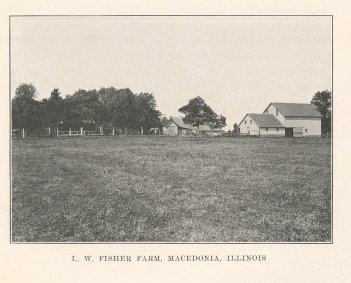
Pg 64
Politically, Ewing is Democratic, but mixed tickets are frequently elected. Riley Burton is the present supervisor.
Pg 65
ber of hearing him say that he never had seen a piece of corn bread in his life until he came to America and when he tried to eat it he thought it would skin his throat. I have heard him say that he would rather eat bread made from wheat bran than to eat the best of corn bread. I went to school in turn to J. J. Dollins, Lewis McCasland, William Moore, Thomas Moore, Lewis Phillips, George W. Peck (not the author of Peck's Bad Boy), and Carroll Moore. In my young days I took great delight in fishing and it was pretty hard for my father to keep me from going fishing of Sundays. However, if my father ever whipped me it was before I could remember, not since. Mother, however, used to crack my head with the spinning stick for bothering her wheel, by getting my head too close to the thread while being twisted, and having my hair twisted with the thread. I remember once when a small boy, crawling between two feather beds in summertime and going to sleep and when mother found me I was nearly cooked. I can also remember of being at a reaping, that is where they cut wheat with reap hooks. It was quite different then, to what it is now. We had no machinery to harvest grain and grass, and the mills for grinding grain were the old horse mill and the watermills. I have many a time ridden on a sack of corn, on a horse with the gears on, 8 or 10 miles to mill in cold weather, and maybe then when I got there, would have to wait some times all day for my turn to come to grind, with nothing to eat but corn roasted or parched in hot ashes. We had no clock in those days, and I call to mind once when milling was to be done, that father thought it near daylight, got up and made a fire, and mother got breakfast, and we started to old Uncle Joshua Britton's Horsemill in the upper end of Long Prairie. When we got there, there was a man grinding and when he was done we hitched up and ground out our turn-father acting as miller-and we got back home by sun up, and it was cold frozen weather too.
In 1854 we had a drouth so severe that there was little or no corn raised, and as there was no wheat-or very little-
Pg 66
raised, then the people were badly put to it for bread. There was a good mast that year, that is the forest trees were full of acorns and hickory nuts and as the woods was full of hogs, they got fat for pork. The farms then were small and no two joined together, and as there were better crops North the I. C. R. R. was put in running order that year, we could get corn by going to the railroad for it if we could get the money. Lots of the men worked on the railroad for money to buy bread, and with an open winter, and the fodder corn, the people carried most of their stock through all right. Most everybody sowed a little wheat that fall and it was an excellent crop. I remember father helped Uncle Tom Moore tramp out his wheat - the only crop of wheat raised in the whole neighborhood that year-and got about three bushels of wheat and we sowed it where we had cut off our corn stalks, and brushed it in as we had no harrow. We harvested 65 bushels of wheat from it, a part of which we beat out with flails, the balance, however, we had threshed with a thresher
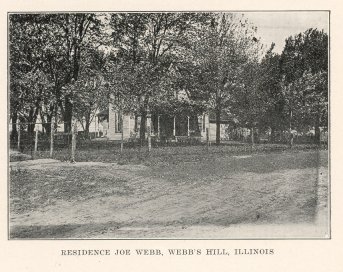
Pg 67
that did not clean it. We had to fan it. The year 1855 was an excellent crop year and as people were not in debt much they soon got over the crop failure. It did not take much money then to run a family like it does now. Our mothers made most of the cloth for our clothing and the farmers wives and daughters did not try to dress as well as the bankers wife and daughters did then, and while the people generally had plenty to eat it was much plainer than now. Before 1855 wheat bread was a rare luxury, canned fruits, rolled oats, and granulated sugar were unknown. A young couple getting married could set up to house keeping alright for five dollars. Lots of them did with less. A skillet and lid, a meal sieve, a dinner pot, two cups and saucers, two plates and a couple of knives and forks were not to be grinned at for a start. However, people seemed to enjoy themselves then as well as now, and in fact, I believe better for their wants were fewer and consequently were easier gratified.
Perhaps it would not be out of place here to tell what a biscuit cost in those days, I mean before 1856. The wheat
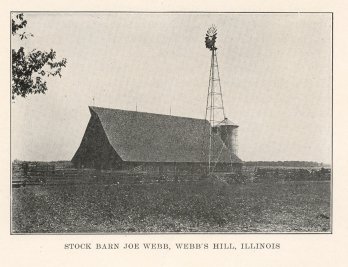
Pg 68
was cut with scythe and cradle, tramped out with horses or flailed out with flails, and in the absence of fan mills it was separated from the chaff by slowly pouring out of a vessel held above your head in a strong wind, or in the absence of natural wind, two men would take a common bed sheet and double it in the middle, the long way and pull it tight at top and with the lower hands give it a whipping motion towards the grain that was being slowly spilled out on the ground as above noted. After being separated from the chaff it was hand picked to free it from dirt-gravel and small pieces of horse dung, if it had been tramped out. Then to the mill where it was ground without further cleaning, being bolted by hand. I have eaten biscuits that you could feel the dirt in your teeth, but I will say there was not a peck or two of them found cold in the safe or shelf as then called. I remember it was about 1852 or '53 that father sold a nice two-year-old heifer for six dollars and got a barrel of Belleville flour - $5.00 per barrel- and a jug of molasses and 50 cents worth of sugar fixing for a two-day meeting. Oh, but didn't we riot in good things to eat, and speaking of meeting, it seems like that the Christian people enjoyed themselves then better than now, for there was no church nearer our place than Benton; probably not over a half dozen professed Christians in our whole settlement, yet, they fixed a place at Uncle Joe Weston's - now the James Hobbs' Farm-for a two-day meeting to commence on Friday night, and by Saturday night it was "boiling" so to speak, mourners praying, Christians shouting, and dogs barking, made a racket that interested me greatly.
But to return to the family. My grandfather was a gallant soldier under Andrew Jackson at New Orleans and I used to love to sit and hear him relate his experiences in that war, and doubtless from what I learned from him had something to do in causing me to enlist in my country's service, for as as soon as I was old enough to read the history of my country I became a strong patriot. Our family as far back as I can
Pg 69
trace, was Democratic, my father voting that ticket up to 1862, when he quit it and voted the Republican ticket the rest of his life. Of course I was a Democrat because "Dad" was. I was a strong believer in "The Little Giant," Stephen A. Douglas. Lewis Whittington-my uncle-and myself put up the first flag in this county with Douglas' name on it. But after the election in 1860 - I was not old enough to vote - I began to see that the Southern Democrats caused Lincoln's election for the purpose of an excuse to disrupt the Union and that it was likely that trouble would come to our country, and that it was the duty of all patriots of all political faiths to support the government by words and deeds, so it took me but a short time to make up my mind which side I should support in the spring of 1861. I hired to James W. Moore to work three months at eleven dollars per month and was to get paid as I needed it, but owing to the unsettled conditions of the country and hard times, he could pay me but little. I had no clothes fit to wear in company, and all I got of my three months' work to buy clothing was one pair of brogan or coarse shoes, two hickory pants-or cloth to make them rather. So when my time was up with him he paid me off in trade as follows: to pay $28.00, I got a good cow 8 years old at $11.00; a nice two-year-old heifer at $9.00, and his note due in six months for eight dollars. I gave the note and heifer to father and left the cow with him until I came home from the army in 1864.
August 15th, 1861, I enlisted in a company being raised in Benton, but owing to a disagreement in its organization- two men wanting to be captain-it failed to organize, but on Sept. 16th, 1861, some twenty-five men from Franklin County, among whom I was one, went to Cairo, Illinois, and joined Co. I, 31st Regt. Illinois Volunteers, Col. John A. Logan commanding. Carroll Moore and Riley Moore-uncles of mine- went with us.
My experience as a soldier I presume was about that of the average soldier. I never had any trouble with my superior
Pg 70
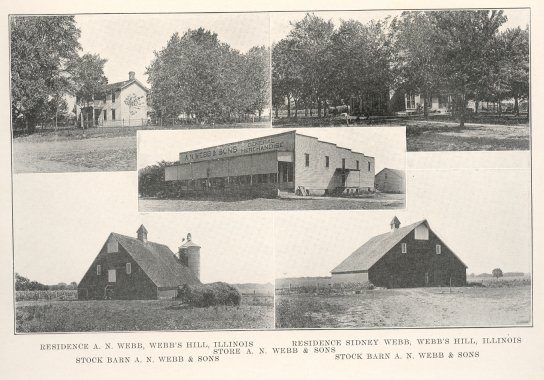
Pg 71
officers or my fellow soldiers, was never punished for anything while out, and never missed but two roll calls without permission while I was out, and one of these times I was asleep in my bunk, the other I was out on a pass and the order for noon call was issued after I left camp. My first battle was at Belmont, Nov. 7, 1861, and in other battles as in order named, Ft. Henry Feb. 6th, Ft. Donelson Feb. 12-16, Spring 1862, was in the siege of Corinth, Miss., was at Corinth in Oct. 1862, with army in Grant's campaign through Miss., in Winter 1862-3, at Battle of Thomson's Hill May 1st, 1863, at Bayou Ferry, May 3, at Baker's Creek May 12, at Jackson May 14-15, at Champion Hills May 16th, in siege of Vicksburg from May 19th to July 4th, when the Confederate army surrendered in the battle 22nd July, 1864, at Atlanta, Ga., where I was captured and taken to Andersonville, Ga., a prisoner of war where I remained until the 17th day of Sept., when I was removed to Lovejoys Station where I was duly exchanged and mustered out of service one day after my term of enlistment had expired. And I want to say here that the most beautiful thing I ever saw was THAT GLORIOUS OLD FLAG, the Star Spangled Banner, and the uniform of the American soldier. Notwithstanding I came out of the service broken in health I have never regretted the service I rendered my country and if called on to name the proud acts of my life I should name the day of enlistment in the service of my country.
While nature was sinking in silence to rest,
The last gleams of daylight shone dim in the West,
In deep meditation, I wandered my feet over fields
Bright by pale moon's light, in lonely retreat.
While passing a garden I paused to hear a voice
Faint, though plainly of one that was there
The voice of the sufferer affected my heart
While pleading in anguish the poor sinner's part.